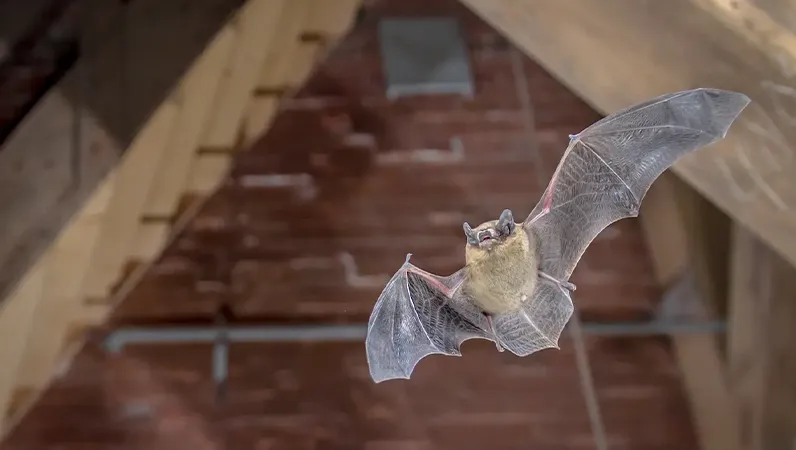No, it is not recommended to sleep in the same space as a bat. It’s unsafe and could put you at risk. Bats can carry serious diseases like rabies, and since they often move silently and swiftly, you may not even realize you’ve been exposed. If there’s a bat in your home, you have every reason to take it seriously.
A bat flying loose in your home is the stuff of nightmares! While it might seem like something out of a horror movie, it’s a real and serious situation that calls for help from a bat control expert.
What Are The Risks of Bats?
Bats are known carriers of rabies, a deadly virus that affects the brain and spinal cord. It can be passed to humans through bites, scratches, or contact with broken skin or mucous membranes. Less than 1% of wild bats are infected, but around 3 to 10% of those tested after human encounters test positive. If you’ve been exposed, medical treatment must begin before symptoms appear; otherwise, the disease is fatal.
Bat droppings, also known as guano, might not seem dangerous at first glance, but they can pose serious health risks. Here are the key concerns you should know about:
- Accumulation Over Time: As guano builds up in attics, walls, or other areas, it creates the perfect environment for fungal growth.
- Risk of Histoplasmosis: One of the most serious health threats linked to guano is histoplasmosis, a lung infection that can become severe or even life-threatening, especially for individuals with weakened immune systems.
- Inhalation of Harmful Spores: The greatest danger comes from inhaling microscopic spores released by dried guano, which can become airborne and easily enter the lungs.
How Do I Protect My Family from a Bat in My House?
The safest thing to do if a bat is in your home before a bat control expert arrives is to sleep somewhere else. This eliminates the chance of accidental contact with your family and gives the bat time to calm down or possibly even leave on its own. If you can’t sleep somewhere else, here are a few steps you can take to reduce your risk:
- Stay Calm and Move Slowly: If a bat is flying around your room, remain calm and avoid sudden movements. Panicking can cause the bat to fly more erratically. Remember, it’s likely more frightened of you than you are of it.
- Contain the Bat in One Room: Close all interior doors to prevent the bat from entering other parts of the house. This helps limit potential exposure and makes it easier to monitor the bat’s location.
- Block Hiding Spots: Use cardboard, towels, or similar materials to temporarily seal off small gaps, vents, or other areas where the bat might try to hide. Reducing escape options increases the chance of a smooth removal.
What Should You Do If a Bat Bites You?
If you are bitten or scratched by a bat, don’t wait. Seek medical care immediately. Bats can carry rabies, a disease that must be treated immediately, and is 100% fatal to humans once symptoms begin to appear. Though the disease is treatable, it must be treated before symptoms appear. Once signs like fever, confusion, or unusual behavior begin, rabies is deadly.
Doctors use a treatment called post-exposure prophylaxis (PEP) to stop the virus before it spreads to your brain. PEP includes wound cleaning, a dose of rabies immune globulin, and several vaccine shots over a short period. If started promptly, this care is nearly 100% effective at preventing the disease.
Trusted Bat Removal Experts in Virginia
When dealing with a bat inside your Virginia home, your safety and well-being must come first. Handling the situation on your own can be risky, which is why you should trust the bat control experts at Xceptional Wildlife Removal. Your uninvited guests are managed by our team gently and effectively. We’re here to help you safely remove bats from your home and protect your family from potential health threats.
Call Xceptional Wildlife Removal, and we’ll provide professional and prompt assistance for your bat problems.

